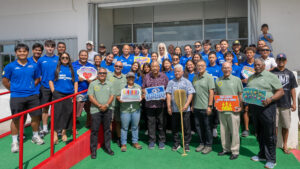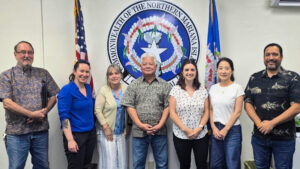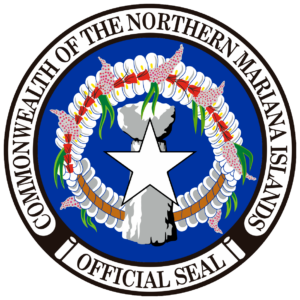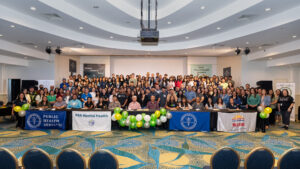The spirit behind House Joint Resolution 21-008 is indeed noble in its intents. It is my understanding from the discussions that took place during the House Standing Committee on Federal & Foreign Affairs meetings that such measure evolved with the intent to initiate dialogue about military activities in the Commonwealth between my Administration and the Legislature. I write to you in effort to share with the members of the Legislature that I share in this interest and have been proactive in pursuing the espoused goals of HJR 21-008 for nearly the entire duration of my time in the Executive Branch. Truly it is one of the most critical responsibilities I have taken.
The Department of Defense programs in the Commonwealth will certainly have far reaching effects on our economy, environment, natural resources, and the character and quality of life for our citizens. This is a matter of significant importance that requires vigilance, meticulous attention to detail, due diligence, and meaningful dialogue in order to forge collective efforts to maximize opportunities and benefits for our people and the Commonwealth while protecting our environment and natural resources. The significance placed on the decisions related to proposed and expanded military activities in the Commonwealth has been demonstrated publicly over the course of the last decade without deviation from the central message of ensuring adequate protections for our economy, heritage, culture and environment.
It is for this reason that I am unclear as to how the Joint Resolution is establishing any meaningful adjustment to the present collaboration between my Administration and the Legislature. As you are aware, I have respected the significance of our decisions relating to the proposed uses of the military on our islands and have acknowledged that the long-term consequences of our actions go far beyond gubernatorial or legislative terms. For that reason, political gain from these decisions should find the rare occasion where conscientious review of the details, policy and diligent examination of consequences should be paramount over politically advantageous restatements of existing policy.
As your Standing Committee on Federal & Foreign Affairs deliberate on the merit of the joint resolution, I write to present background information on my proactive approaches on matters relating to the Department of Defense (DoD) initiatives in the Commonwealth so that a responsible approach can be measured by the Legislature for the best interest of ongoing dialogue between the Commonwealth and our nation’s national security needs.
The interest of the Commonwealth and of our people has always been at the forefront of my agenda. While issues have arisen in the decades long relationship between the Department of Defense and the Commonwealth people, resolution and the balance of the best interest of our people, both residents of these islands and as citizens of our country, require collaboration and consistent dialogue. My efforts to ensure that our concerns are addressed has long started since my tenure at the Legislature and goes beyond the 902 Consultation process that was concluded in 2017.
As the Senate President during the 18th Legislature, I stood strong on my opposition to any proposal that would harm our people and our way of life. I conveyed a resounding message to DoD leaders at the time, that no consideration should be given to activities without first respecting the people of the Commonwealth and the leadership of our islands are treated as partners in the development of military initiatives. I conveyed in that time that respect is showcased in the development of proposals which hold sacred the history and culture of our people and the respect we hold for our natural environment.
My transition to the Executive Branch did not diminish my resolve to continue opposing Defense proposals that resulted in the degradation of our environment and opportunity for our people. In fact, I advanced efforts to ensure that our concerns are heard and addressed during my tenure as the Lt. Governor and through the Section 902 consultations as Governor. The Section 902 process provided in our Covenant Agreement with the United States is the highest form of consultation that speaks to our very existence as a commonwealth in political union with the United States. It is reserved for the issues of gravest importance that impinge upon this relationship. The use of this channel to lay bare the emotional, cultural, environmental and economic consequences of DoD activities resulted in laying the foundation for an open and respectful consultative collaboration between our government and the Department of Defense.
Through a series of meetings with DoD leadership at various forums, I have consistently echoed my position against CJMT as originally proposed. Understanding the magnitude and consequences that the DoD program will have on our culture, the environment, and the character of our island community, I have been cautious and deliberative in my approach. I continue to ensure that our concerns are not only heard by Joint Region Marianas and INDOPACOM but have understood the necessity of communicating our voice to the decision makers in the Pentagon and among policy makers in Washington, D.C.
We have provided a strong and consistent voice for the people of the Commonwealth concerned by the proposed activities, yet I have made every effort to ensure that the needs of our nation are balanced, weighed, and given the consideration they deserve. I believe throughout this process in the importance of building a foundation of mutual respect and work toward establishing a beneficial partnership with DoD. I remain committed towards further strengthening our partnership and to setting forth a common ground to obtain the greatest benefit for the Commonwealth while supporting the U.S. national security interests of our region and the world.
In these many years of dialogue, false starts, setbacks and leaps forward, the military has begun to recognize that the concerns of the people of these islands must be heard and of the importance of mutual respect and beneficial partnership. Through relationships the Commonwealth has built with then Deputy Commander Anthony Crutchfield, his successor Deputy Commander Bryan Fenton of INDOPACOM, Rear Admiral Bette Bolivar of Joint Region Marianas, her successor Rear Admiral Shoshana Chatfield and today, with Rear Admiral John Menoni at Joint Region Marianas, and INDOPACOM Commander Phillip Davidson and his team led by Major General Suzie Vares-Lum, we have made great progress in strengthening our partnership through a consultative framework that would ensure our concerns are continuously addressed.
The Divert Activities and Exercises is one example of the successes that were achieved through conscientious dialogue. The program was first proposed by the United States Air Force (USAF) in 2011 with the publication of the US Air Force notice of intent to prepare an Environmental Impact Statement for the Divert Activities and Exercises in the Guam and the CNMI. More than 7 years later, the CNMI and the Tinian leadership celebrated the signing of a $21.9M purchase agreement on November 2018 and the subsequent execution of a 40-Year lease agreement on May 2019 made possible by years of dialogue and trust building. This was only the beginning, however. My Administration continues to work closely with CPA to ensure that the DoD continues to pursue programs and services that bring lasting benefits to the people of Tinian, while investing in the economic growth of the island.
The Marianas Islands Training and Testing (MITT) program, which largely focused on increasing the use of the Mariana Islands Range Complex (MIRC) for training to accommodate the military realignment of forces to and within the Pacific, was similarly initiated in 2011. Extensive comments regarding the possible detrimental environmental effects were submitted in 2013. While just inaugurated as Lieutenant Governor, the Navy’s decision to permit the landing of mechanized amphibious vehicles on beaches in Tinian was not acceptable to the protection of the beaches, our ocean ecosystem, or Tinian community. I strenuously objected and was thankful the Navy agreed to defer moving on this inevitably destructive action. This was further reemphasized in the Navy’s notice of intent to publish a supplemental EIS/OEIS where it reflected that the Navy was not pursuing the use of mechanized amphibious vehicles.
In 2017, the Navy initiated the supplemental EIS/OEIS process for MITT. The Administration submitted extensive comments through many agencies as well as my office when the Supplemental EIS was issued in 2019. The comments focused on the detrimental environmental and economic effects the proposed activities would have on the Commonwealth. However, upon committing hundreds of staff hours to highlighting the impacts of this proposal on the resources of the CNMI, I was unsatisfied with the Navy’s response to our concerns. I saw no choice but to cease the Section 106 Consultation process for the execution of a new MITT Programmatic Agreement. A systematic framework between the CNMI and DoD has since been established to address CNMI concerns. The Commonwealth recently issued its conditional concurrence on the MITT’s federal consistency determination and once more we remain in close, and respective dialogue while holding firm to the needs and concerns of the CNMI people.
Furthermore, my Administration’s effort is further heightened with the publication of the Final Supplemental EIS/OEIS. Once again concerned with that the Navy was not addressing the CNMI’s concerns, I elevated my engagement to the Pacific Fleet Deputy Commander, Admiral Whitesell. In response, Admiral Whitesell and Rear Admiral Menoni sent a team to work collaboratively with my departments and agencies to further address concerns I raised and to work towards inclusion of mitigation measures into the Final ROD that was recently published.
While there remain considerable number of concerns to be addressed, some of the critical priorities that I requested to be documented in the ROD were included. Such commitments are enumerated below:
1) To improve communication, collaboration, and data sharing with CNMI regulatory agencies and to provide its library of resources to the CNMI.
2) To develop a Standard Operating Procedure within 6 months of ROD issuance to establish a process through which necessary engagement, such as, routine meetings between appropriate Navy representative and local government officials and resources agencies, can be held to address procedural and ongoing CNMI concerns;
3) To conduct archaeological survey at FDM to enhance cultural resource management and to improve the CNMI’s historical record;
4) To develop a baseline of FDM geophysical conditions and conduct monitoring to gauge changes in FDM’s geophysical condition;
5) To work with CNMI towards increased understanding and agreement on analytical data needs and methods in support of cumulative impact analysis;
6) To reevaluate the 3NM restriction at FDM for public access and communicate findings to the CNMI;
7) To investigate if CNMI resource agencies can either independently conduct or collaboratively participate in studies at and around FDM and other Navy leased properties and to provide the CNMI with criteria and standards to facilitate such access;
8) To perform a supplemental literature review of reef fish bioaccumulation pathway and nearshore sediment and water quality related to military expended materials;
9) To co-fund additional beaked whale monitoring and stranding analysis in the Study Area, inclusive of organizing a workshop to improve the understanding of beaked whale occurrence and potential effects from Navy activities in the Marianas.
Ahead of us, is the eventual publication of the Revised EIS for the Commonwealth Joint Military Training (CJMT) proposal currently being formulated by the proponents of the action. CJMT was originally proposed in early 2000 and since its official release in 2015, I have been firmly and consistently opposed the activities proposed in the plan. I publicly conveyed my strong objection to the original proposal then and I continue to do so today. In fact, it was on my insistence that the military agreed to suspend all activities regarding this proposal in October 2017, which placed in abeyance forward activity on the proposal until its recent revival. I maintain the same message, I am a proud American, in service of proud Americans, but we cannot allow our islands to be treated with any less consideration afforded to any community in the U.S. mainland. No community would permit the level of destruction proposed under the original CJMT plan to occur in their home. We demanded that our voices be heard and, thousands of our people joined together to force the DoD to reconsider their proposed action.
Still the relationship between the CNMI and the DoD continued in good faith dialogue, strengthened by the respect given to the concerns of our people.
In August of 2019, departments and agencies from the central government, the Tinian Mayor’s Office and his municipal departments and agencies participated in the field study alongside DoD. I led a CNMI delegation, comprised of members of the House and the Senate, Mayors and delegations of the Commonwealth’s municipalities, and CPA, to Hawaii to witness first-hand the live-fire demonstrations of weapons proposed for use on the island of Tinian. This was essential to ensuring that the CNMI spoke from a full awareness of the sights, sounds, and emotions that would potentially be felt by our community should the use of these ordinances be permitted.
The U.S. military continues to engage in training exercises on the lands and the waters surrounding the Commonwealth. Some of these training exercises are large joint training exercises involving the Navy, Air Force, Army and Marine components, along with our nation’s allies. In addition to these major exercises, a number of less extensive exercises continue to support the training requirements of our military within our shores and our waters. It is important to note that there are a multitude of ways in which the CNMI Government and this community interact and support our national security interests, but the frequency of the activities must not discount the need to ensure their continued respect for our people and our environment.
In the past, actions were taken that were clearly not allowed under the National Environmental Protection Act (NEPA) or were taken without the permission or consultation of Commonwealth agencies. My Administration and CPA undertook efforts to ensure that the military complies with NEPA as well as any agreements governing conduct that may exist. Departments and agencies are carefully assessing military activities to ensure compliance with relevant federal and local regulations.
Standing up the Commonwealth Bureau of Military Affairs serves yet another effort of my Administration to respond to the magnitude, complexity, and dynamic nature of Department of Defense programs proposed for our islands. The designation of a central office with the sole focus on military matters has been both a necessary and critical element in ensuring that we can better understand and manage the incremental risk associated with each action, as well as, properly manage the demands on the limited Commonwealth resources and capacities. This Office serves a crucial role in ensuring the DoD maintains its commitment to respond to the concerns of the CNMI government and help foster improved channels of communication for notifications, permitting requirements, and coordination with the Commonwealth government. Working in close collaboration with Joint Region Marianas Political-Military and Regional Environmental Affairs Office, CNMI-JRM Coordination Office, and Mariana Islands Range Complex Operations Office, the Department of Defense has increased its transparency efforts by expanding the sharing of information of exercise activities to enable the Commonwealth to have a deeper awareness of training schedules and training activities being conducted in the CNMI. To further its commitment to responding to our concerns, JRM is expanding its initiatives by working towards assigning a dedicated military liaison officer to work closely with the Bureau.
While I remain vigilant with the three major DoD initiatives and ongoing training exercises, my Administration has been pursuing opportunities that stand to benefit our islands and communities.
A study on the construction capacity on Tinian was initiated to ascertain how the U.S. Air Force, Marine Corps, and private/commercial development construction will impact existing Tinian infrastructure, utilities, as well as to determine what improvements or expansions are needed to meet construction needs. The analysis would be of great interest to the Commonwealth and Tinian governments and communities as it would help identify shortfalls and possible opportunities in the municipality.
The 1997 Tinian Environmental Baseline Survey identified the mortar range on Tinian and east of North Field as a potential environmental concern. The discovery of unexploded ordinances resulted in both sites being included on the Munition Response Program. I pushed DoD to conduct a remedial investigation and a feasibility study to determine if Chiget Beach is safe to open to public access. While it does not appear to involve the complete clean-up of the entire range, a remediation work plan is currently in progress with actual removal work being one of Rear Admiral John Menoni’s priority. This project is important as it has the potential to open a scenic area of Tinian to the public and tourism. We are closely monitoring this activity to ensure the least level of disruption to the people and the economy of Tinian.
As part of my Administration’s Sustainable Opportunities Strategies in building the Commonwealth’s resiliency, a Resilient Sustainable Islands Management Plan is currently being initiated. This would involve a thorough assessment and analysis of focused interests in the areas of the Commonwealth’s economic/fiscal conditions, use of land and resources, infrastructures (public utilities, transportation, housing and education), public safety, health and social services, among other functional areas of interest to develop the Commonwealth’s programmatic requirements.
The Whole of Government Technical Support Services would equip the Office of the Governor to ensure the Commonwealth’s programmatic requirements and equities are fully represented during the deliberations of the Economic Adjustment Committee of the Department of Defense. The overall objective is to secure Congressional authorizations and appropriations for critical infrastructure funding that are desperately needed to enhance the resiliency and sustainability of the Commonwealth’s capacity.
The most recent initiative that my Administration is pursuing is to aid the CPA in enhancing and building upon its existing capacity. This initiative is in support of my partnership with CPA to undertake a comprehensive long-range strategic review of the CPA’s infrastructure, financials, and markets and to identify funding mechanisms to meet our overall objective of sustaining and enhancing the operational effectiveness, resiliency, and sustainability of its intermodal infrastructure in response to the evolving and emerging transportation and cargo transshipment demands.
Following the hard lessons of Typhoon Soudelor, the administration used its improved relationship with the Department of Defense to improve Defense Support for Civilian Authorities (DSCA) coordination efforts. DSCA is a program whereby in times of disaster, military forces can be used in coordination with FEMA and local authorities for disaster relief services. Improving coordination with DSCA officers for Joint Region Marianas yielded positive results as DOD’s response was far more rapid and effective for Typhoon Mangkhut, Super Typhoon Yutu, and the COVID-19 pandemic than it was for Typhoon Soudelor. Millions of dollars of resources poured into the Commonwealth to support our local response efforts to disaster aftermath and the crisis that the pandemic brought to our community.
While the list of positive outcomes above are not all inclusive, my Administration continues to pursue beneficial opportunities for the Commonwealth and our people. It should not, however, be construed that I have let my guard down in dealing with the Department of Defense on matters that are a detriment to the viability of our economy, our environment, our natural resources, and the quality of life. I remain vigilant and proactive.
Common trust and mutually beneficial opportunities can only be possible by building an enduring partnership, in the same manner where meaningful collaboration can be best achieved by talking to each other. Policy discussions on military matters is of critical importance. It requires active and deliberative collaboration between my Administration, the Legislature, Mayors of respective municipalities and with our citizens in order to further advance the overall interest of our community and the Commonwealth.
The actions and decisions of the CNMI government related to military use of our lands and our resources are deeply rooted in our Covenant and the consequences of our decisions will last for generations. We have made every effort to responsibly balance the interest of our people, culture and history with the needs of our Nation’s Armed Forces. We can be both strong advocates for the rights of our islands and proud Americans. The work continues and will continue under the mutual respect and understanding we have worked hard to develop over the course of these last 5 years.
Sincerely,
/s/
RALPH DLG. TORRES
Governor






